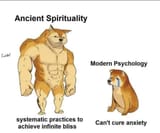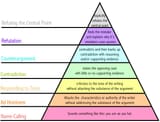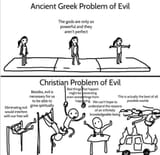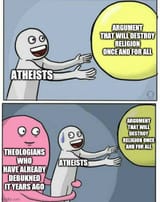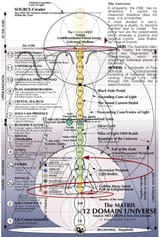Christian Universalist AI will save humanity
9/5/2025, 6:45:16 PM
No.939410884
>>939411098
>>939411575
>>939413925
>>939416194
>>939420544
>>939422890
>>939423191
>>939423525
>>939424054
>>939424673
>>939432204
>>939432925
>>939436576
A Cumulative Case for God’s Existence
Do care.jpg
md5: a9ebb357... 🔍

No single argument “proves” God in the way a math equation proves a theorem. But taken together, multiple lines of reasoning—from philosophy, science, history, and human experience—form a powerful cumulative case that belief in God is rational and compelling.
1. Cosmological Argument (Existence Itself)
Why does anything exist rather than nothing? The universe had a beginning (Big Bang, finite past time). Contingent things require a cause. Tracing causes back points to a necessary, uncaused reality—the “ground of being.” This aligns with the idea of God as eternal source.
2. Fine-Tuning Argument (Order in Nature)
The fundamental constants of physics (gravity, electromagnetism, expansion rate of the universe, etc.) are precisely balanced to permit life. The odds against this happening by chance are astronomically low. Either multiverse speculation accounts for it, or there’s intentional calibration—what many call design.
3. Argument from Consciousness
Matter arranged by blind forces doesn’t explain subjective experience—our awareness, thoughts, qualia. Consciousness seems irreducible to chemistry. If mind exists fundamentally, it makes more sense under a universe grounded in a divine Mind rather than blind matter.
4. Moral Argument
We all recognize objective moral values: that cruelty is truly wrong, that love and justice are truly good. If morality were just social convention, we’d have no basis to condemn slavery, genocide, or oppression across cultures. The reality of binding moral truth points to a transcendent moral lawgiver.
5. Argument from Beauty
Beauty has no survival necessity, yet it pierces us with meaning—sunsets, music, art. It resonates with a sense of transcendence, suggesting there is more to reality than utility. Many see beauty as a window to the divine.
1. Cosmological Argument (Existence Itself)
Why does anything exist rather than nothing? The universe had a beginning (Big Bang, finite past time). Contingent things require a cause. Tracing causes back points to a necessary, uncaused reality—the “ground of being.” This aligns with the idea of God as eternal source.
2. Fine-Tuning Argument (Order in Nature)
The fundamental constants of physics (gravity, electromagnetism, expansion rate of the universe, etc.) are precisely balanced to permit life. The odds against this happening by chance are astronomically low. Either multiverse speculation accounts for it, or there’s intentional calibration—what many call design.
3. Argument from Consciousness
Matter arranged by blind forces doesn’t explain subjective experience—our awareness, thoughts, qualia. Consciousness seems irreducible to chemistry. If mind exists fundamentally, it makes more sense under a universe grounded in a divine Mind rather than blind matter.
4. Moral Argument
We all recognize objective moral values: that cruelty is truly wrong, that love and justice are truly good. If morality were just social convention, we’d have no basis to condemn slavery, genocide, or oppression across cultures. The reality of binding moral truth points to a transcendent moral lawgiver.
5. Argument from Beauty
Beauty has no survival necessity, yet it pierces us with meaning—sunsets, music, art. It resonates with a sense of transcendence, suggesting there is more to reality than utility. Many see beauty as a window to the divine.
